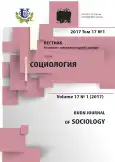South Kurdistan: Factors of the Iraqi Kurds’ national identity
- Authors: Khoshawi H.H.1
-
Affiliations:
- Peoples’ Friendship University of Russia (RUDN University)
- Issue: Vol 17, No 1 (2017)
- Pages: 96-105
- Section: Contemporary society: the urgent issues and prospects for development
- URL: https://journal-vniispk.ru/2313-2272/article/view/340489
- DOI: https://doi.org/10.22363/2313-2272-2017-17-1-96-105
- ID: 340489
Cite item
Full Text
Abstract
The article considers factors determining the peculiarities of the integration processes in Iraqi Kurdistan. The formation of Iraqi Kurdistan as a social-political community was determined by the growth of national consciousness of the population of the autonomy, and by accelerating processes of self-determination under the influence of a number of external and internal reasons. The national identity of the Iraqi Kurds as a part of the Kurdish people is based on the same historical background, language, and culture, on the mental attribution of the Kurds to the single group, which is explained not only by historical facts, but also by a specific worldview and myths sometimes divorced from reality but rooted in the collective representations. The external pressure of direct aggression and political enforcement to the assimilation plays a key role in the consolidation of the Iraqi Kurds and in the growth of their national self-determination: the resistance to the common enemy strengthens the national identity of the Iraqi Kurds. The author examines factors both general for all the Kurds and specific for Iraqi Kurdistan, i.e. the strengthening of the common form of language through the education, literature and media institutions, and the development of economic relations and civil and political institutions, which is due to the autonomy status of Iraqi Kurdistan. The article identifies and examines objective reasons preventing intensive integration processes in the community of Iraqi Kurds, which are, on the one hand, the influence of the external forces including neighbor states, transnational corporations, the authorities of Baghdad, and the growing military aggression of the armed terrorist groups; on the other hand, the slowdown of integration processes inside Iraqi Kurdistan are due to the internal contradictions in the autonomy determined by the features of the social and political structure of the Kurd society, such as tribalism, immaturity of the political system, and ethnic and religious diversity.
About the authors
Hawlla Hawlla Khoshawi
Peoples’ Friendship University of Russia (RUDN University)
Author for correspondence.
Email: xoshawi82@yahoo.com
Miklukho-Maklaya St., 6, Moscow, 117198, Russian Federation
References
- Asatryan G.S. Talyshskij fenomen i kurdskaya mozaika – real'nost' i illyuzii [Talysh phenomenon and Kurdish mosaic – reality and illusions]. Available from: http://ru.1in.am/1140639.html. (In Russ).
- Bohen'ska I., Lanchenko I., Shahnazaryan N. Kurdskaya mekka? Gora Ararat v vospriyatii kur-dov (o simvolah identichnosti) [Kurdish Mecca? Mount Ararat in the perception of the Kurds (about symbols of identity)]. Diaspory. 2010;(1). (In Russ).
- Vasil'eva E.I. Kurdskie istoriografy o kurdskih plemenah (ot Sharaf-Hana Bidlisi – XVI v. do Mirzy Ali-Akbara Kurdistani – XIX v.) [Kurdish historiography on Kurdish tribes (from Sharaf Khan Bidlisi – XVI to Mirza Ali Akbar of Kurdistani – XIX)]. Pis'mennye pamyatniki Vostoka. 2010;(2). (In Russ).
- Vertyaev K.V., Zhigalina O.I., Ivanov S.M. Politicheskie processy v kurdskih arealah stran Za-padnoj Azii (Irake, Turcii, Sirii, Irane) [Political processes in the Kurdish areas of Western Asia (Iraq, Turkey, Syria, Iran)]. Moscow; 2013. (In Russ).
- Ivanov S.M. Irakskij Kurdistan na sovremennom etape (1991-2011 gg.) [Iraqi Kurdistan at the Present Stage (1991-2011)]. Moscow; 2011. (In Russ).
- Istoriya Kurdistana [History of Kurdistan]. Moscow; 1999. (In Russ).
- Kurdskij faktor v regional'noj geopolitike [The Kurdish Factor in Regional Geopolitics] (Materialy kruglogo stola v IMEMO RAN 11.03.2015 g.). Moscow; 2015. (In Russ).
- Lazarevskie chteniya [Lasarev Readings]. Moscow; 2012;(2). (In Russ).
- Minorskij V.F. Kurdy – potomki midyan [The Kurds as descendants of Medes]. Pis'mennye pa-myatniki Vostoka. 2013;(1). (In Russ).
- Primakov E.M. Konfidencial'no: Blizhnij Vostok na scene i za kulisami (vtoraya polovina XX – nachalo XXI veka) [Confidential: The Middle East on the Stage and behind the Scenes (Second Half of XX – Early XXI Century)]. Moscow; 2006. (In Russ).
- Sal'nikov A.S. Ponyatijnye harakteristiki koncepta “patriotism” v kurdskoj poezii [Conceptual characteristics of the term “patriotism” in the Kurdish poetry]. Filologicheskie nauki. Voprosy te-orii i praktiki. 2009;(1). (In Russ).
- Sal'nikov A.S. “Svoi” v kurdskoj poezii [“Our” in the Kurdish poetry]. Vestnik Voronezhskogo gosudarstvennogo universiteta. Seriya “Filologiya. Zhurnalistika”. 2010;(1). (In Russ).
Supplementary files









